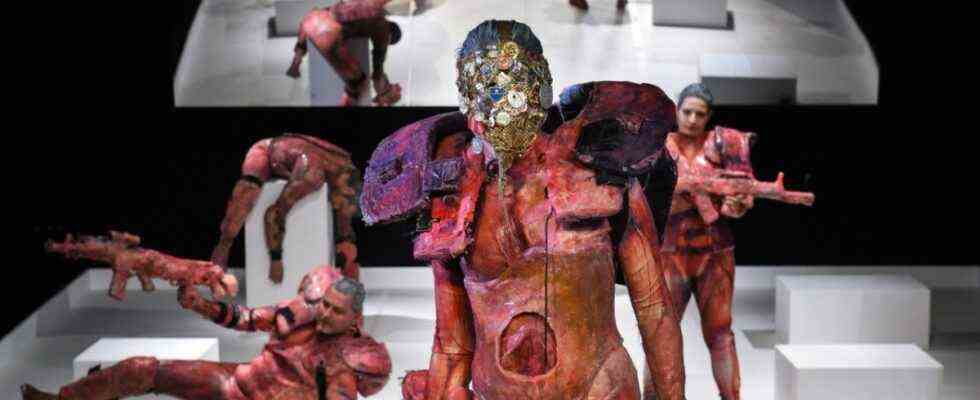Women are dominating this year Mülheim Theater Days. Six of the seven premiered plays that will be in the running for the renowned Mülheim Drama Prize from May 7th to 28th are by female authors. The best known is the Austrian winner of the Nobel Prize in Literature and Mülheim record holder Elfriede Jelinek, who has been there twenty times and has won the prize four times. With “Noise. Blind Vision. Blind Vision!”, premiered by Karin Beier at the Deutsches Schauspielhaus Hamburg, she wrote the play about the pandemic: a nasty cacophony of news, rumors and conspiracy myths, from the early Corona hotspot Ischgl to the infection process in of the Tönnies meat factory.
The other nominees belong to a new, young generation of German-language playwrights, many of whom are represented in Mülheim for the first time, such as Nora Abdel-Maksoud from Munich. With “Jeeps”, by herself premiered at the Munich Kammerspiele, the 39-year-old has succeeded in creating a fast-paced satire on authorities and classism on the subject of inheritance in Germany. The Austrian Teresa Dopler, born in 1990, is also a Mülheim debutante, invited with her play “Monte Rosa” (Schauspiel Hannover), which comes along as an absurd mountaineering drama, but the substructure primarily tells of self-optimization and a lack of empathy. The Berlin newcomer Sarah Kilter, born in 1994, questions milieu and identity attributions as a German with non-German roots in “White Passing” (Schauspiel Leipzig / Deutsches Theater Berlin).
The air is getting thin at the top: Scene from “Monte Rosa” by Teresa Dopler at the State Theater in Hanover, with (from left) Mathias Max Herrmann, Lukas Holzhausen, Nikolai Gemel.
(Photo: Kerstin Schomburg)
The author Sivan Ben Yishai, who lives in Berlin, also writes herself into her play. In “Wounds Are Forever” (Nationaltheater Mannheim) she addresses her life as an Israeli in Germany by surfing through time accompanied by a German shepherd and condensing an adventurous superwoman biography. It is a wild ride through one’s own biography and the past century, from the Holocaust to the founding of Israel. Helgard Haug, female part of the directors’ collective Rimini Protokoll, is with her solo project “All right. Good night.” (HAU Berlin) represented. In it, she connects her father’s dementia with the crash of a Malaysia Airlines plane to an evening about the disappearance. The only man in the selection is Akın Emanuel Şipal, born in Essen in 1991, with the play “Mutter Vater Land” (Theater Bremen), a Turkish-German-Silesian family story.
“Not only was the level of many plays high, the variety was also great – thematically and formally. Contemporary drama cannot be defeated by difficult times,” summarized jury spokesman Wolfgang Kralicek when announcing the selection. The Mülheim Drama Prize, endowed with 15,000 euros, will be awarded by a jury in public discussion at the end of May after the performances of the plays in Mülheim an der Ruhr.
The Children’s Plays Competition, which is endowed with a further 15,000 euros, also takes place at the same time. Five works were selected for this. Theresia Walser, chair of the children’s plays jury, said many dealt with questions of identity – such as the play “When the world learned to go backwards” by Lena Gorelik, which premiered in Munich’s Pathos Theater, a theatrical fantasy about a different world in which children find themselves brush your teeth with Nutella and boys prefer to wear dresses. The other nominated children’s plays are: “Stuff” by Raoul Biltgen, “The Strange and Unbelievable Story of Telemachos” by Felix Ensslin with Galia De Backer and Ninon Perez, “Grandma Monika – what was?” by Milan Gather and “The Fabulous Die” by Sergej Goessner.

